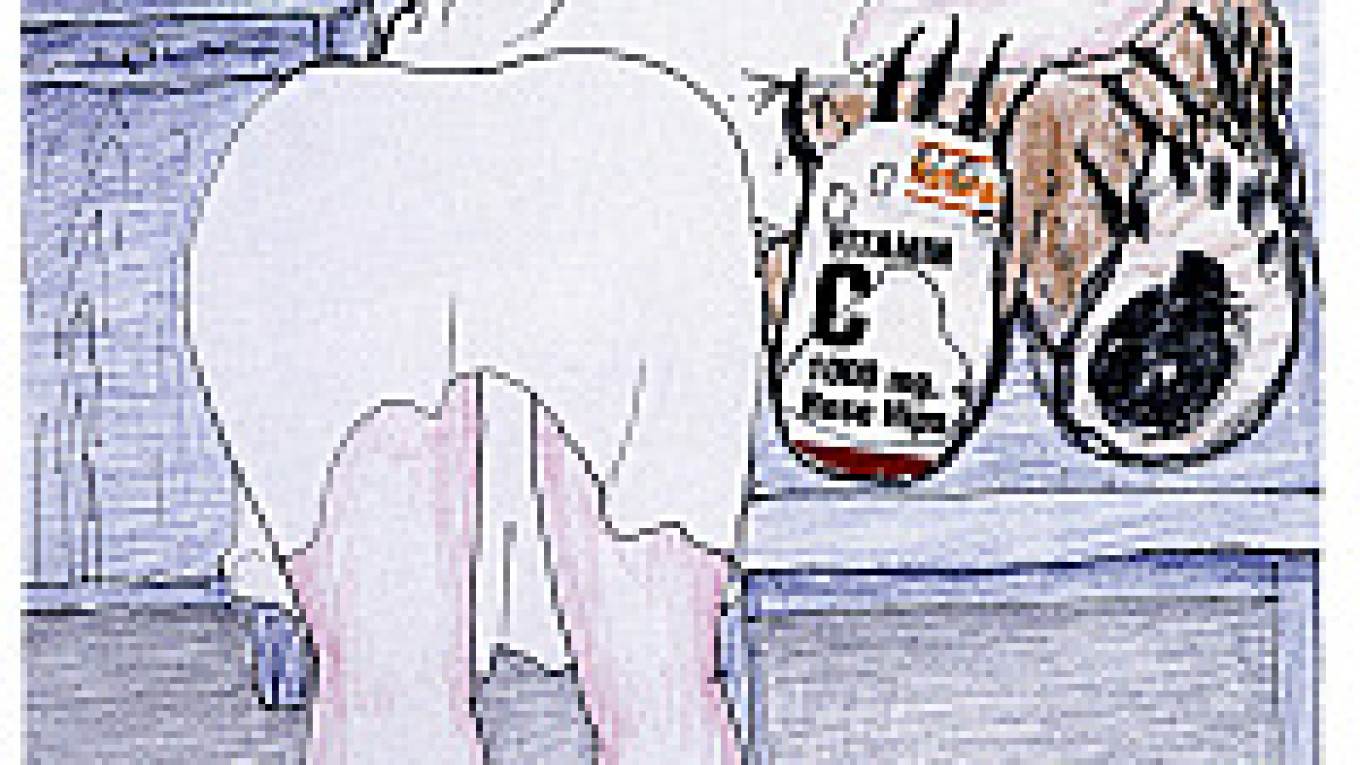In the late '60s Viktor Tupitsyn began writing poetry. His nonconformist work was widely circulated in the artist community and was even recited by famous Russian actor Alexander Kaidanovsky. These poems eventually formed a collection called "Poems for Children, the Elderly and the Disabled," a reference to the phrase that has been repeated for decades in the public service announcements in the metro.
After Tupitsyn had long left the country, he asked his artist friends, such as Timur Novikov, Erik Bulatov and Ilya Kabakov to illustrate a poem of their choice. A compilation of the work has recently been published by World Art Muzei (WAM).
"Tupitsyn himself is a mathematician, but he's in the mold of a Renaissance man. He is also a curator, a philosopher, a theoretician and a poet," said Yegor Larichev, the chief editor of WAM, which also published "Moscow New York."
"The poetry in itself is not offensive, but you have to read between the lines and look at the tone," Larichev said.
The form of a children's book is an ironic reference to artistic life in the Soviet Union. Many of the artists featured in the compilation were not allowed to work as artists because they were considered nonconformists. Instead, figures like Bulatov and Kabakov were employed as illustrators for children's books.
In the early '70s there were talks about publishing the book. "Even though the poetry was nonconformist, it was still treated as just children's poetry. But then Tupitsyn had a disagreement with authorities as he left the Soviet Union, and so he became vocally anti-Soviet," Larichev said.
After the publication of "Moscow New York," he said, Tupitsyn approached the publisher with his poetry, which caught Larichev's eye immediately.
The poems, supposedly for children, have a naive tone and a neat meter but often have an ambiguous meaning. One such poem, "Bear Paw," poses the question of why, if bear paws are so nutritious, bears are not kept in hospitals where their paws could be used for healing purposes?
"Bear Paw" is illustrated by Leonid Sokov, an artist who often draws bears, usually juxtaposed with Western imagery. One of his most famous pictures is of Marilyn Monroe in her floaty white dress, giggling as she is mauled by a bear.
The picture for "Bear Paw" shows a nurse with a bear's head in a short white dress, bending over the bear while holding a syringe. On his left paw are printed the words "vitamin C 1000mg + Rose Hips" and is pale and drained compared to his right paw. The picture is drawn in ink and colored in pencil.
Another picture is by the deceased artist Timur Novikov for the poem "Meeting" which opens with "On the blue, blue stream / Hurrying from the distance / Floats neither a candle for God / Nor a poker for the devil."
Novikov's painting is a blue rectangle on white paper, with a red sun sinking into it. It's typical of the minimalist compositions that he uses on large fabric. In this particular picture thin pencil lines on top of the page say "For Margarita," Tupitsyn's wife.
Despite its rather ambiguous content and illustrations, Larichev said he had tried reading the book to his seven-year-old daughter.
"I think she liked it," Larichev said. "She had a lot of thoughts and questions afterwards, but I think that is a good thing."
"Poems for Children, the Elderly and the Disabled" (Stikhi dlya detei, starikov i invalidov) is published by WAM. For more information see www.ageytomesh.ru.
A Message from The Moscow Times:
Dear readers,
We are facing unprecedented challenges. Russia's Prosecutor General's Office has designated The Moscow Times as an "undesirable" organization, criminalizing our work and putting our staff at risk of prosecution. This follows our earlier unjust labeling as a "foreign agent."
These actions are direct attempts to silence independent journalism in Russia. The authorities claim our work "discredits the decisions of the Russian leadership." We see things differently: we strive to provide accurate, unbiased reporting on Russia.
We, the journalists of The Moscow Times, refuse to be silenced. But to continue our work, we need your help.
Your support, no matter how small, makes a world of difference. If you can, please support us monthly starting from just $2. It's quick to set up, and every contribution makes a significant impact.
By supporting The Moscow Times, you're defending open, independent journalism in the face of repression. Thank you for standing with us.
Remind me later.


